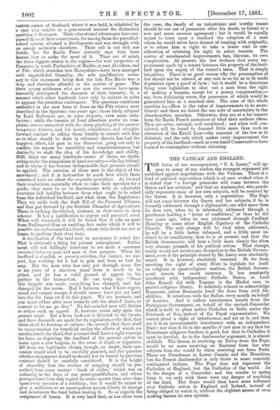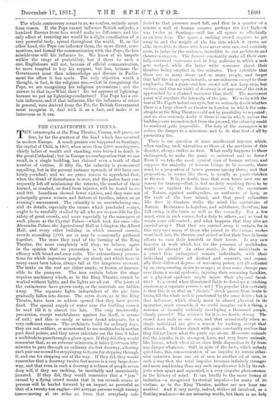THE VATICAN AND ENGLAND.
THE letter of our correspondent, " T. A. Lacey," will ap- pear to many of our readers the strongest argument yet published against negotiations with the Vatican. There is a kind of political superstition which is at once evoked when it is stated that " a foreign potentate will come between the Queen and her subjects," and that an Ambassador, who practi- cally represents some Of her own subjects, will be received by the Queen. It is, however, only a superstition. The Pope will not come between the Queen and her subjects, if he is formally addressed through a diplomatist, one whit more than he does now, when he is informally addressed through a gentleman holding a " letter of confidence," or than he did two years ago, when he was addressed through Cardinal Manning or some other English dignitary of the Catholic Church. The only change will be that when addressed, he will be a little better informed, and a little more in- clined to be conciliatory, than he is at present, and that the British Government will hear a little more clearly the often very obscure grounds of his political action. That change, surely, would not involve any derogation to the British Govern- ment, even if the principle stated by Mr. Lacey were absolutely sound. It is, however, absolutely unsound. So far from asserting the right of every State to legislate for itself on religious or quasi-religious matters, the British Govern- ment asserts the exact contrary. It has constantly interfered with independent Catholic States, as Lord John Russell did with Tuscany in the Madiai case, to protect religious liberty. It definitely refused to acknowledge Roumania, unless Roumania freed the Jews from civil dis- abilities. It interferes with the Sultan every month on behalf of heretics. And it suffers interference hourly from the Portuguese Government, on behalf of the ancient Concordat which isheld to place native Catholics in India under the Patriarch of Goa, instead of the Papal representative. We cannot plead a right of interference, and act on it, and then say it is an unwarrantable interference with an independent State'; nor does it lie in the mouths of just men to say that for Protestants religious freedom is good, but that to Catholics it must be hurtful. As to the Ambassador argument, it is almost childish. The Queen, in receiving an Envoy from the Pope, would be no more receiving an Embassy from her own subjects than she would be when receiving one from Paris. There are Frenchmen in Lower Canada and the Mauritius, but the French Ambassador is only theirs in some remotely sentimental fashion. The Pope . does not represent the Catholics of England, but the Catholics of the world. As to the danger of a Concordat, and the results to spring from it, we only wish there were any danger of anything of the kind. The State would then have some influence over Catholic action in England and Ireland, instead of being obliged to watch it, without the slightest means of even making known its own opinion.
The whole controversy seems to us, we confess, entirely apart from reason. If the Pope cannot influence British subjects, a hundred Envoys from him would make no difference, and the only effect of receiving one would be a slight conciliation of a very powerful body, spread throughout the world. If, on the other hand, the Pope can influence them, the more direct, cere- monious, and formal the communication with the Pope, the less mischievous will his influence be. We know of no bargain within the range of probability, but if there be such a one, Englishmen will not, because of official communication, be more tempted to by his support, but less, because the Government must then acknowledge and discuss in Parlia- ment the offers it has made. The only objection worth a thought, in fact, is the religious one,—that in recognising the Pope, we are recognising his religious pretensions ; and the answer to that is,—What then ? Do we approve of lightning, because we put up lightning-conductors ? The Pope has a cer- tain influence, and if that influence, like the influence of crime in general, were derived from the Pit, the British Government must recognise it, deal with it as a fact, and make it as innocuous as it can.











































 Previous page
Previous page